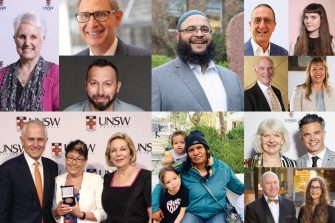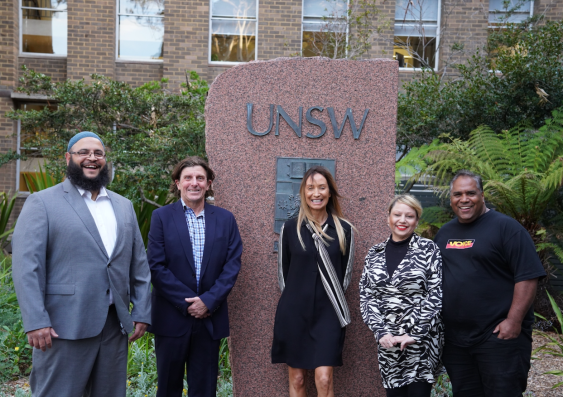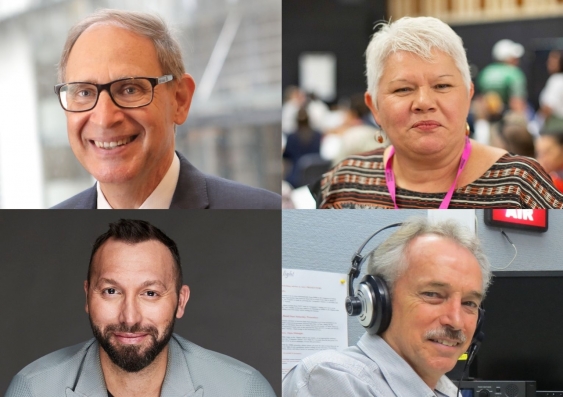Nominations open for the 2025 Australian Mental Health Prize
2025-05-27T08:00:00+10:00

Previous winners of the Australian Mental Health Prize.
Image: UNSW
It's been 10 years since the national prize first launched to recognise Australians who have made outstanding contributions to mental health awareness and treatment.
Despite improvements in mental health, urgent challenges to help those in need still remain. That's the overwhelming sentiment from some of Australia's leading mental health experts.
This year marks the 10th anniversary of the highly regarded Australian Mental Health Prize. As nominations open for the 2025 prize, leading mental health advocates reflect on a decade of transformation, and the urgent challenges that remain.
Established by UNSW Sydney, the Prize honours Australians who have made outstanding contributions to mental health across four categories: Aboriginal or Torres Strait Islander, Lived Experience, Professional, and Community Hero.
“This milestone year is an opportunity to reflect on how far we’ve come — and where we need to go next,” said University of Sydney Adjunct Professor Sophie Scott, Chair of the Australian Mental Health Prize Advisory Group and award-winning journalist and author.
“It’s a chance to recognise the individuals and community leaders who are making a real difference, often with little fanfare and limited support.”
Over the past decade, the Prize has spotlighted leading clinicians, researchers, advocates, peer workers, educators and community leaders. Many have influenced national mental health policy, shaped new models of care, and driven cultural change within their own communities.
UNSW Scientia Professor Gordon Parker, 2020 recipient and founder of the Black Dog Institute, said Australia must continue to value rigorous research and independent thinking — particularly as new approaches to treatment emerge.
“There is promising work being done in fields like the gut-brain connection and mood disorders, but we must stay evidence-based and challenge ideas that don’t hold up. We also need to do more to support the next generation of researchers. Without them, innovation stalls.”
Ellison Professor of Aboriginal Young Peoples’ Social and Emotional Wellbeing at Murdoch University and 2024 winner, Professor Juli Coffin works with Aboriginal young people in regional Western Australia. She said mental and physical health must be treated together — and that relational, culturally grounded care must be properly funded.
“People are realising that wraparound, community-led models work. The challenge is that they’re often overlooked in favour of programs that continue to deliver little impact. We need to shift how success is measured — and who gets to define it.”
Professor Kimberlie Dean, forensic psychiatrist at UNSW Sydney and member of the Prize Advisory Group, said the past decade has seen progress in recognising lived experience and community-led innovation, but significant gaps remain.
We’ve seen encouraging growth in the peer workforce and online service delivery. Yet the burden of mental ill-health, especially among young people, continues to rise. The system must evolve to better support what we know works — and do so at scale.
As part of this milestone year, past winners are also sharing their advice to the next generation of changemakers — from championing lived experience and challenging broken systems, to leading with courage, kindness and conviction.
“Have the courage to not know and let the people most affected provide the answers you don’t have,” said Dr Louise Byrne, 2024 recipient and Director of Lived Experience Training. “That’s how we build a system that actually works — by listening deeply, challenging old assumptions, and backing real-world knowledge.”
“Be kind to the marginalised, and lead with love, truth and conviction,” said Megan Krakouer, 2023 recipient and Director of the National Suicide Prevention and Trauma Recovery Project. “Real change starts with honesty, integrity and heart.”
Professor Attila Brungs, UNSW Vice-Chancellor and President, said the Prize reflects the University’s commitment to fostering long-term, evidence-based impact through trusted partnerships.
“For a decade, the Australian Mental Health Prize has helped shine a light on those advancing mental health outcomes in communities across Australia,” Prof. Brungs said. “We remain dedicated to critical societal conversations about mental health and driving collective impact in this space.”
Nominations for the 2025 Australian Mental Health Prize are now open and close on July 23, 2025.
Visit Australian Mental Health Prize for more information.
Media enquiries
For enquiries about this story and interview requests please contact Fleur Townley.
Tel: 0405 278 758
Email: fleur@lanhammedia.com.au





